- Blog
- Kako uvesti automobil u Poljsku
Kako uvesti automobil u Poljsku
Otkrijte kako uvesti automobile u Poljsku iz EU u ovom detaljnom vodiču za trgovce. Saznajte više o propisima, porezima i procesima kako biste maksimizirali profit na poljskom tržištu. 
Jeste li trgovac automobilima koji želi proširiti svoje poslovanje uvozom vozila iz EU u Poljsku ?
Ovaj vodič će vas provesti kroz proces, pokrivajući sve, od razumijevanja poljskog tržišta rabljenih automobila do detaljnog postupka uvoza.
Uvoz automobila može biti profitabilan pothvat, ali zahtijeva poznavanje tržišta, propisa i postupaka. Detaljno ćemo objasniti svaki aspekt kako bismo vam pomogli da glatko i učinkovito prođete kroz ovaj proces.
Upoznajte poljsko tržište rabljenih automobila
Poljsko tržište rabljenih automobila značajan je sektor automobilske industrije u zemlji, a uvozna vozila igraju glavnu ulogu.
U Poljsku je 2023. godine uvezeno otprilike 736.000 rabljenih automobila . To je blagi pad u odnosu na prethodne godine, vjerojatno zbog ekonomskih čimbenika i promjenjivih propisa.
eCarsTrade nudi internetske aukcije automobila ex-lizing vozila iz Europe!
Prosječna starost uvezenih rabljenih automobila u Poljskoj je oko 13 godina. Ta se brojka postupno povećava, što odražava trend uvoza starijih vozila.
Njemačka ostaje glavni izvor uvezenih rabljenih automobila , a slijede Francuska, Belgija i Nizozemska.
Dizelska vozila ponovno dobivaju na popularnosti u Poljskoj. U međuvremenu, pad cijena novih električnih vozila utječe na tržište rabljenih automobila, prisiljavajući na značajne popuste na modele stare 2-3 godine i uzrokujući brzi pad njihove vrijednosti posljednjih mjeseci.
Što se tiče marki, Volkswagen je najpopularnija marka među uvezenim rabljenim automobilima, ali Audi A4 je najpopularniji model automobila.
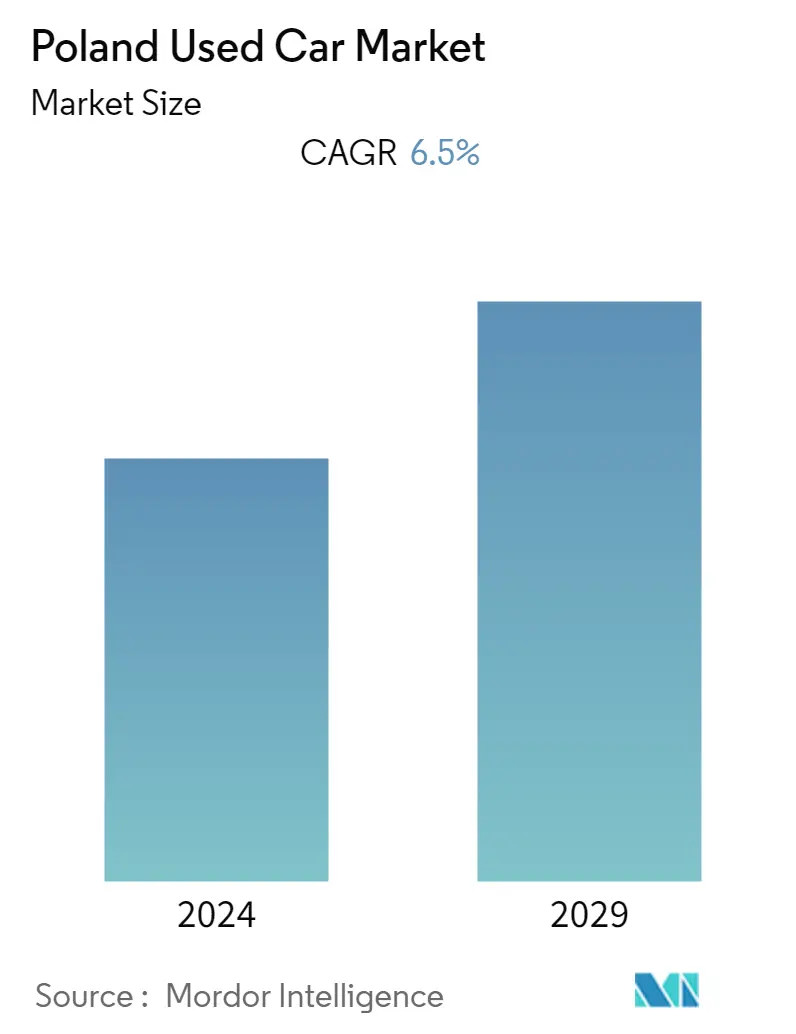
Izvor: Mordorska obavještajna služba
Ukupna vrijednost tržišta rabljenih automobila u Poljskoj procijenjena je na otprilike 18 milijardi eura u 2021. godini, a očekuje se da će do 2027. narasti na 28 milijardi eura .
Potrebna dokumentacija za uvoz automobila u Poljsku
Kao trgovac automobilima koji uvozi vozila u Poljsku, morat ćete se snaći s potrebnom dokumentacijom za nesmetan proces uvoza.
Račun za kupnju vozila
Račun za kupnju je temelj vaše uvozne dokumentacije. Mora jasno prikazivati vaše poslovne podatke kao kupca, podatke o prodavatelju, podatke o vozilu i kupovnu cijenu.
Račun za kupnju primit ćete putem e-pošte, a uvijek mu možete pristupiti putem svoje osobne stranice .
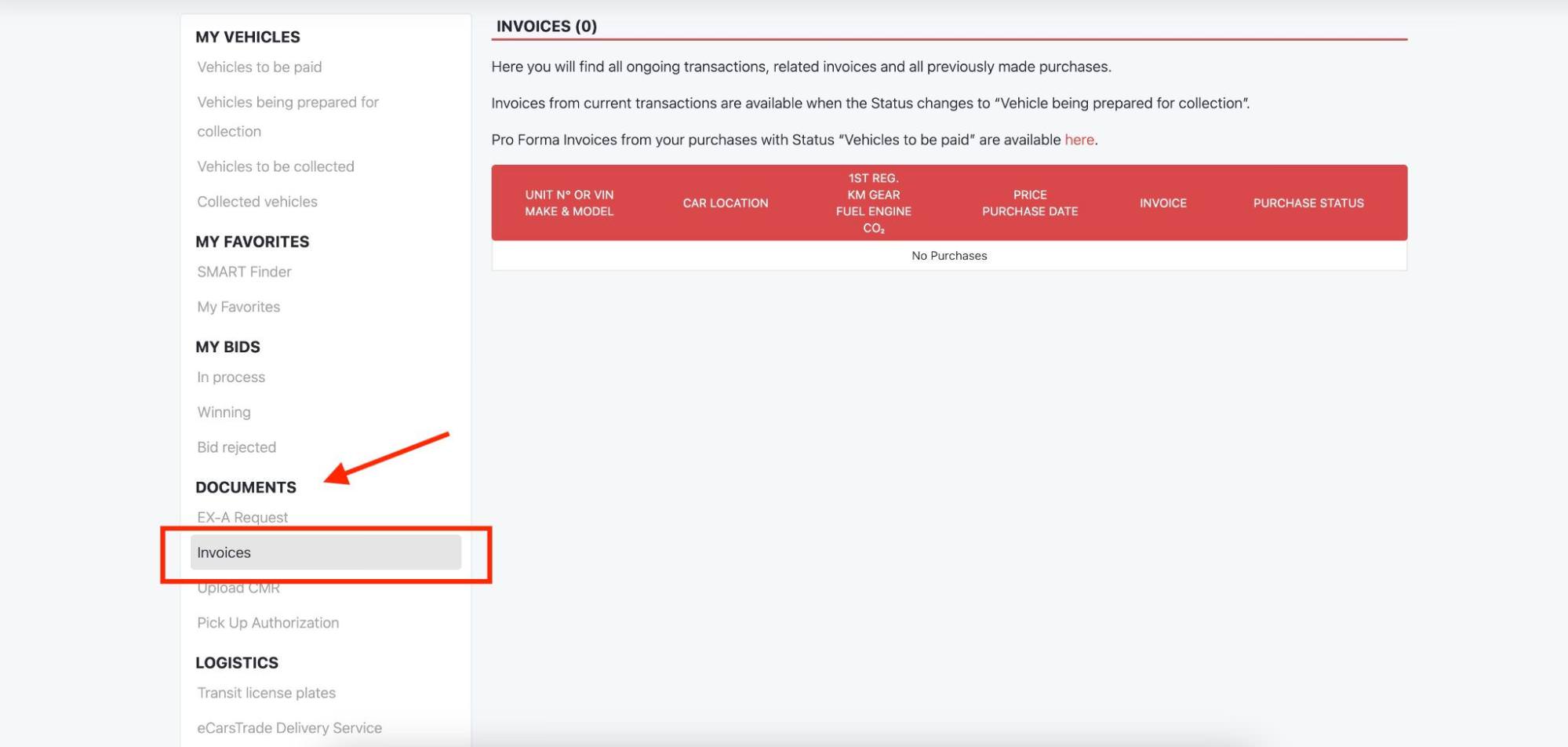
Potvrda o sukladnosti (COC)
COC je ključni dokument koji dokazuje da vozilo zadovoljava standarde EU . Obično ga izdaje proizvođač vozila i važan je za proces registracije.
Po našem iskustvu, neće svi automobili prodani na eCarsTrade imati COC. To često ovisi o tome iz koje zemlje automobil dolazi. Na primjer, automobili iz Francuske rijetko će imati COC.
Dokumenti za registraciju vozila
Kada kupujete automobil preko nas, uvijek dostavljamo originalne registracijske dokumente. Fleksibilni smo u pogledu načina na koji ih možete preuzeti - možete ih preuzeti zajedno s automobilom ili vam ih možemo poslati poštom kamo god želite.
Samo zapamtite, sve ove dokumente trebate prevesti na poljski. Za ovaj korak obavezno koristite službeno priznatog prevoditelja - važno je da sve bude kako treba za vlasti.
Dokaz o osiguranju
Trebat će vam važeće osiguranje za dvije faze: tranzitno osiguranje i privremeno poljsko osiguranje. Tranzitno osiguranje pokriva vozilo tijekom prijevoza u Poljsku, dok je privremeno poljsko osiguranje potrebno nakon što vozilo uđe u Poljsku, čak i prije registracije. Mnogi trgovci odlučuju se za sveobuhvatnu policu koja pokriva i tranzit i početno razdoblje u Poljskoj.
Carinska deklaracija
Za uspješnu registraciju automobila, prvo ćete morati proći carinu. Carinjenje je uključivalo plaćanje trošarine, PDV-a i carinske pristojbe.
Potvrda o tehničkom pregledu
Za proces registracije u Poljskoj ključno je imati nedavnu potvrdu o tehničkom pregledu iz zemlje podrijetla.
Prijevod dokumenata
Sve originalne dokumente o automobilu koji nisu na poljskom jeziku mora prevesti ovlašteni tumač u Poljskoj. To uključuje potvrdu o registraciji vozila, izvješća o tehničkom pregledu i sve ostale prateće dokumente na stranim jezicima.
Porezi, pristojbe i PDV
Glavni porezi i pristojbe s kojima ćete se susresti prilikom uvoza automobila u Poljsku su:
1. PDV (porez na dodanu vrijednost) : Kao trgovac, obično plaćate neto cijene prilikom kupnje vozila, a zatim morate platiti i prijaviti PDV u Poljskoj. Standardna stopa PDV-a u Poljskoj iznosi 23% i izračunava se na temelju ukupne vrijednosti uvezenog vozila, uključujući kupovnu cijenu i troškove prijevoza.
2. Trošarina : Trošarina je još jedan značajan porez koji se primjenjuje na sve uvezene osobne automobile u Poljsku. Stope variraju ovisno o veličini motora, vrsti goriva i emisijama CO2.
3. Naknada za registraciju : Za registraciju uvezenog vozila u Poljskoj morate platiti naknadu za registraciju. Sastoji se od osnovne naknade za registracijsku karticu i registarske pločice vozila, dodatnih naknada za privremene pločice ako su potrebne i naknada za obvezni tehnički pregled vozila.
4. Carinska pristojba : Stopa može varirati, ali obično iznosi oko 10% vrijednosti vozila.
Za više informacija pročitajte naš cjeloviti vodič o poljskim porezima na automobile i poreznom sustavu.
Korak-po-korak proces - od kupnje automobila do uvoza u Poljsku
1. Istražite i kupite vozilo
Pronađite prave automobile za svoj inventar na eCarsTrade aukcijama, fiksnim cijenama ili našoj zalihi i dovršite kupnju! Od nas ćete dobiti svu dostupnu dokumentaciju, uključujući originalne registracijske dokumente.
2. Pripremite se za prijevoz
Nakon kupnje, dogovorite prijevoz vozila u Poljsku . Imate nekoliko mogućnosti:
- Neka eCarsTrade organizira dostavu za vas
- Unajmite profesionalnu tvrtku za prijevoz automobila sami
- Vozite automobil sami s privremenim tranzitnim registarskim tablicama
Koju god metodu odabrali, provjerite je li vozilo propisno osigurano za prijevoz.
3. Prikupite svu potrebnu dokumentaciju
Prije dolaska automobila u Poljsku, provjerite imate li ove dokumente:
- Izvorni račun za kupnju
- Dokumenti o registraciji vozila iz zemlje podrijetla
- Potvrda o sukladnosti (COC)
- Dokaz o osiguranju
- Bilo koja druga relevantna dokumentacija (poput servisne povijesti ili prethodnih tehničkih pregleda)
Što učiniti ako niste dobili Potvrdu o sukladnosti za svoj automobil?
Ovo nije neuobičajena situacija na eCarsTradeu, posebno s francuskim automobilima koji gotovo nikad ne dolaze s COC-om.
Ali ne brinite, dobivanje COC-a čak i ako automobil nije došao s njim je stvarno jednostavno.
Imate dvije mogućnosti:
1) Možete izravno pitati za marku vozila , a oni vam ga mogu pružiti besplatno ili uz određenu cijenu
2) Koristite online uslugu poput EuroCOC-a za brzo i jednostavno dobivanje COC-a
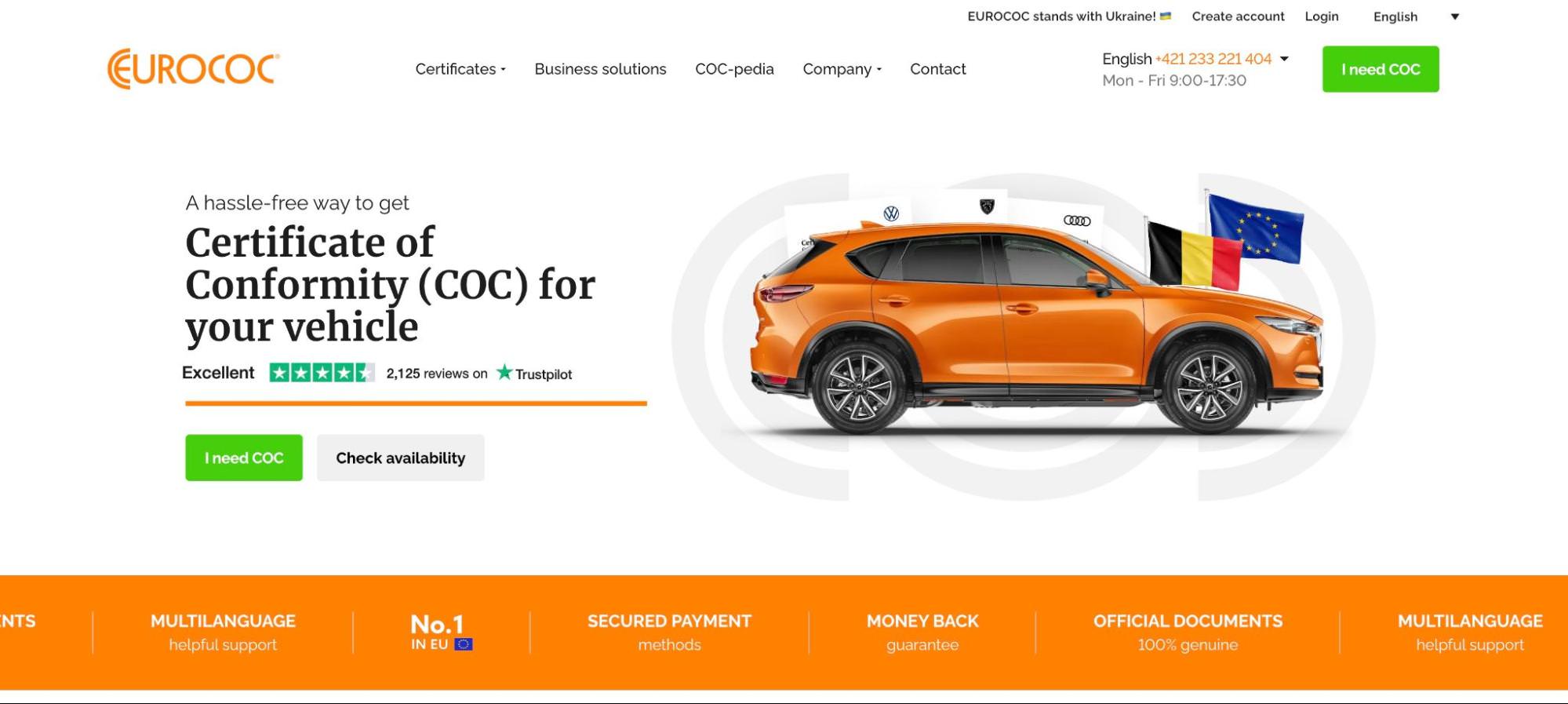
4. Prevedite originalne dokumente vozila na poljski jezik
Kada primite dokumente za automobil, morat ćete ih dati prevesti na poljski kod službenog prevoditelja .
Poljske vlasti zahtijevaju da svi dokumenti budu na poljskom jeziku prilikom registracije vozila.
5. Platite trošarinu
Kada vozilo stigne u Poljsku, morat ćete proći carinu . To uključuje:
Posjetite lokalni carinski ured kako biste to riješili. Najbliži carinski ured možete pronaći tako da na Googleu pretražite "Urząd celny" i odredite svoje područje.
Iznos trošarine ovisi o čimbenicima poput snage vašeg automobila, vrste goriva koje koristi i starosti. Ti će čimbenici odrediti postotak kupovne cijene koji ćete morati platiti kao trošarinu.
Nakon toga, morat ćete ispuniti AKC-U/S deklaraciju . Ako uvozite električni automobil, niste obvezni platiti trošarinu i možete podnijeti zahtjev za izuzeće .
Imate 14 dana nakon što automobil uđe u Poljsku da podnesete AKC-U/S deklaraciju carini.
Još jedna stvar koju treba imati na umu dok prolazite kroz ovaj korak - postoji i carina, izračunata u iznosu od 10% kupovne cijene automobila.
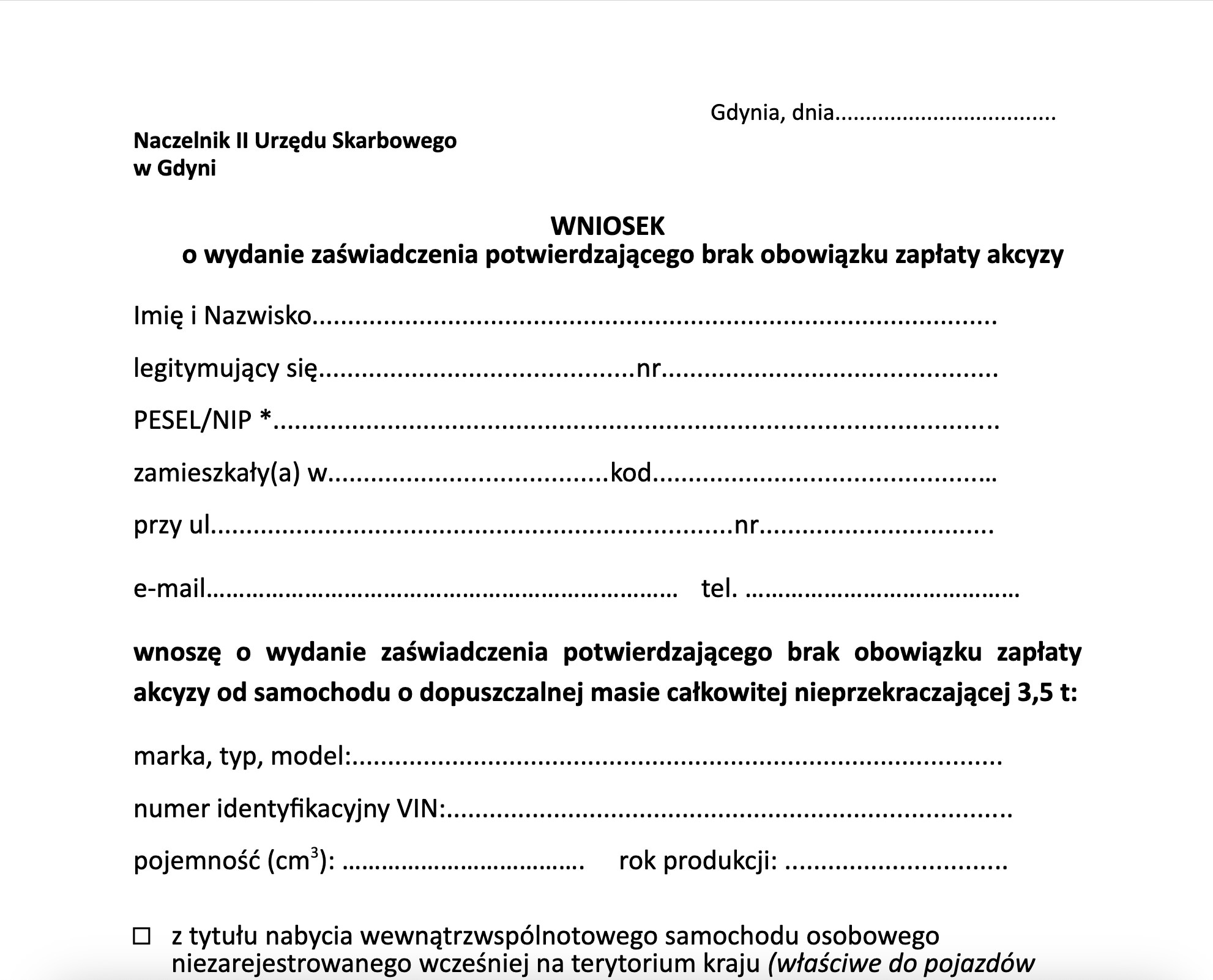 Primjer AKC-U/S izjave
Primjer AKC-U/S izjave
6. Platite PDV
Dok ste u lokalnoj carinarnici, možete platiti i 23% PDV-a na kupovnu cijenu automobila.
7. Tehnički pregled
Za registraciju vozila u Poljskoj potrebna vam je potvrda o tehničkom pregledu .
Odvezite vozilo na tehnički pregled u bilo koju ovlaštenu stanicu u Poljskoj. Ovaj pregled osigurava da automobil ispunjava poljske standarde sigurnosti na cestama.
8. Osigurajte automobil
Nabavite obvezno osiguranje od odgovornosti prema trećim osobama . Tijekom postupka registracije morat ćete predočiti dokaz o osiguranju.
Alternativno, možete se odlučiti za kratkoročno osiguranje od građanske odgovornosti ako planirate odmah prodati automobil nakon što stigne u Poljsku. To vam daje oko četiri tjedna za dovršetak postupka registracije.
9. Registrirajte automobil
Sada imate sve što vam je potrebno za registraciju vašeg vozila!
Ugovorite sastanak s lokalnim uredom za prijevoz - Wydział Komunikacji i Transportu Starostwa Powiatowego .
Idite u Ured za promet sa svim dokumentima koje ste do sada prikupili:
- iskaznica
- Izvorni dokumenti pravno prevedeni na poljski jezik
- Dokaz o plaćenom porezu
- Potvrda o tehničkom pregledu
- Dokaz o osiguranju
- Zahtjev za registraciju
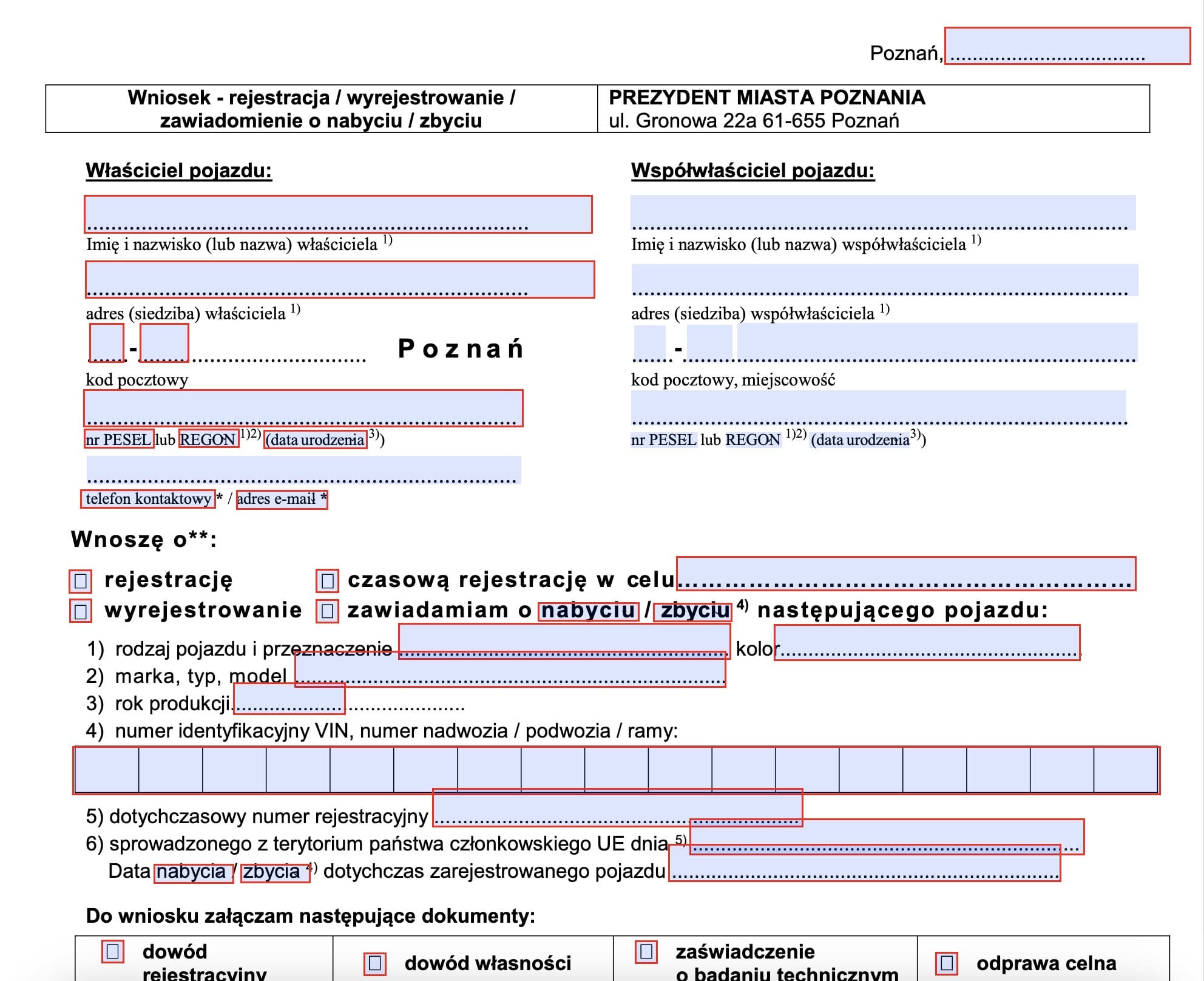 Primjer zahtjeva za registraciju
Primjer zahtjeva za registraciju
Obradit će vaš zahtjev i izdati poljsku vozačku dozvolu (dowód rejestracyjny) i trajne registarske pločice.
10. Nabavite poljske registarske tablice
Nakon što primite trajne registarske tablice, pričvrstite ih na vozilo. I voila, uspješno ste uvezli automobil u Poljsku!
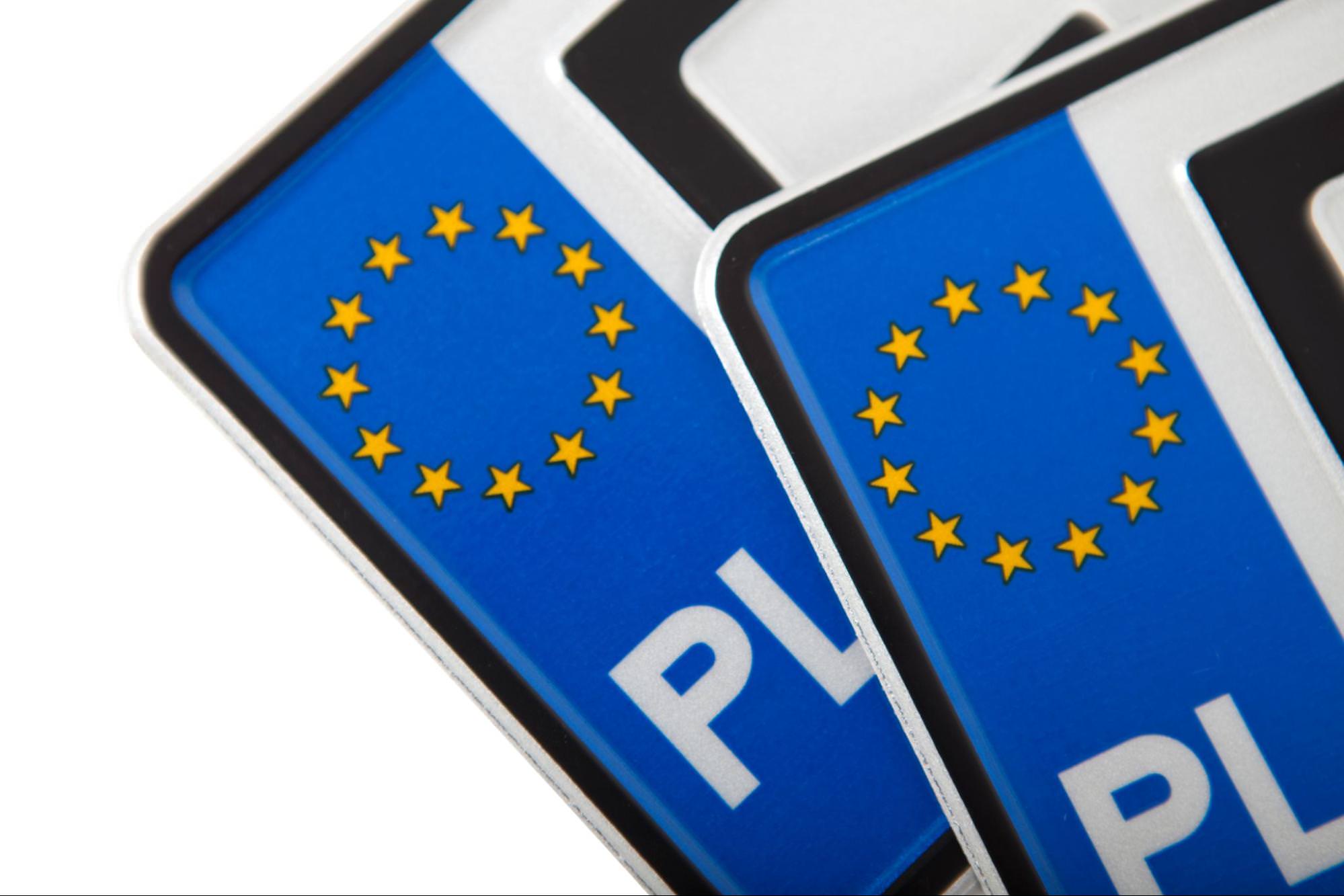
Uvoz automobila u Poljsku - Često postavljana pitanja
► Koliko obično traje proces uvoza?
Trajanje može varirati, ali obično traje između 7 i 14 dana od trenutka kada automobil stigne u Poljsku. To uključuje carinjenje, plaćanje poreza, tehnički pregled i registraciju. Naravno, kašnjenja se uvijek mogu dogoditi iz različitih razloga, stoga uvijek imajte tu mogućnost na umu.
► Moram li biti prisutan tijekom cijelog postupka uvoza?
Kao trgovac, često možete delegirati dijelove procesa ovlaštenim predstavnicima ili carinskim agentima. Međutim, vaša prisutnost može biti potrebna za određene korake, poput potpisivanja službenih dokumenata. Mnogi trgovci smatraju korisnim osobno nadzirati proces, barem za prvih nekoliko uvoza.
► Kako izračunati ukupne troškove uvoza automobila?
Razmotrite sljedeće troškove:
- Kupovna cijena vozila
- Troškovi prijevoza u Poljsku
- Troškovi carinjenja (ako koristite agenta)
- PDV (23% vrijednosti vozila plus troškovi prijevoza)
- Trošarina (varira ovisno o veličini i vrsti motora)
- Naknade za registraciju
- Troškovi tehničkog pregleda
Točan iznos ovisit će o konkretnom vozilu i trenutnim cijenama.
► Postoje li porezne olakšice za uvoz novijih ili električnih vozila?
Da, Poljska nudi neke poticaje za uvoz novijih, ekološki prihvatljivijih vozila. Električna i hibridna vozila često imaju niže trošarine.
Sve što trebate znati o uvozu automobila u Poljsku
Nadamo se da vas je ovaj članak o uvozu automobila iz EU u Poljsku motivirao da proširite svoj inventar nabavljanjem automobila iz inozemstva.
Kako stječete iskustvo, razvit ćete vrijedne vještine u prepoznavanju dobrih ponuda i pojednostavljenju procesa uvoza.
Budite informirani o promjenjivim propisima i tržišnim trendovima te ne podcjenjujte vrijednost izgradnje snažnih odnosa s dobavljačima, lokalnim vlastima i specijaliziranim agencijama za uvoz.
Sigurni smo da ćete uvoz automobila pretvoriti u unosan i profitabilan pothvat u Poljskoj. I zapamtite, eCarsTrade je tu da vam surađuje na ovom putovanju!
Our extensive inventory includes various makes and models to suit all your needs, sourced directly from reputable European leasing companies, short-term rental companies and dealerships:


